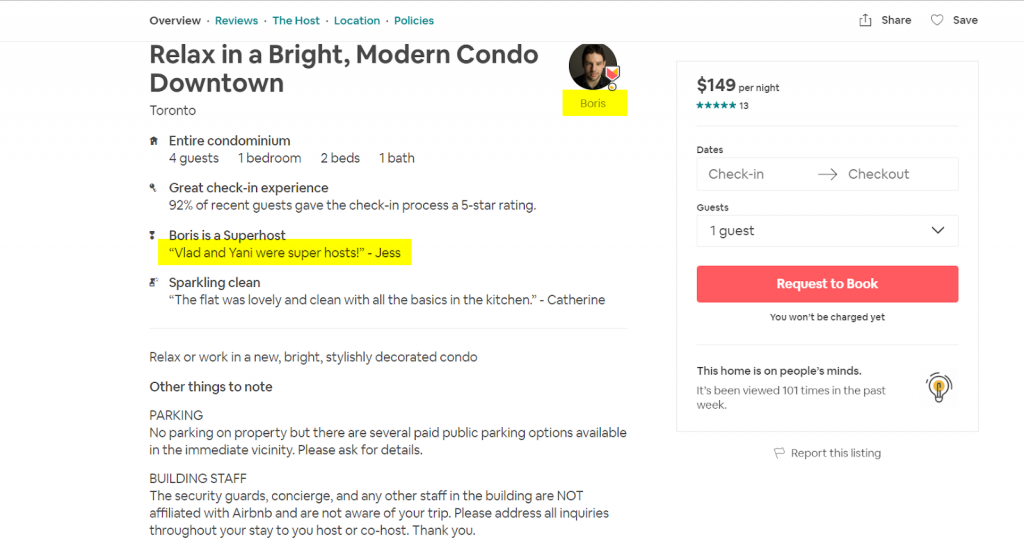In February of this year, a viral video of the 19-Year-Old Marcella Zoia tossing a chair off the balcony of a Toronto high-rise made its way across social media. Recently, she was charged with mischief endangerment of life and mischief damaging property. In light of this incident, the spotlight is on short term rentals (STRs) and their lack of oversight and accountability on the part of their operators. To advocacy group FairBnb, “multi-listing hosts” are the root of the problem; operators of STRs who have multiple properties and listings on Airbnb often don’t pay attention to each property individually. To make matters worse, operators who own multiple properties are serviced by property managers or companies, who are primarily concerned with cleaning, preparing units for the next customer, the bottom line and not the neighbors or the other tenants of the building.
The first steps to safer STRs involve holding owners and operators of these rentals accountable for screening tenants and complying with tax and building ordinance. However, this is more complicated than it seems. The listing below belongs to a Boris, but further research reveals that “Boris” is actually a property management company! Upon a closer inspection, the operator’s name is not actually Boris; Jess leaves a glowing review for Vlad and Yani. Other management companies simply find their most photogenic employee and put his/her mugshot on the profile!
An Airbnb listing under the fake name “Boris”
Finding STR operators are often difficult when they don’t want to be found. Operators can go through great lengths to hide their identity. Often they will only provide a first name or use an alias. Many don’t post names on their listings at all. Other times they purposely remove the ad during the day so that they are less likely to be found.
For most municipal governments, individually finding owners of each property and bringing them into compliance either requires more time and manpower than the government has or is willing to allocate to regulating STRs. This is where Harmari steps in. Harmari is a consulting company that specializes in STR compliance. It offers tools with which local governments can build their own short term rental ordinance, but its primary service is to identify short term rentals for local governments in order to enable them to take appropriate regulatory action.
Through its proprietary algorithms supervised by an army of research analysts, Harmari STR helps municipalities with tax collection, licensing and code enforcement. Each research analyst is directly trained by senior Harmari staff and executives, and our Quality Assurance team has a 33 point checklist for all the work performed on each STR identification, backed by our Six Sigma Black Belt staff. We identify unit numbers, exact addresses, full names of the operators and owners and compile court-defensible evidence so that the authorities can enforce their regulations. Aside from the public benefits of fewer noise, trash, parking, and safety complaints, any City compliance program can benefit from using Harmari STR; local governments stand to gain millions through hotel (lodging) taxes and licensing fees. Since Harmari STR does all the heavy lifting, local governments are essentially paying twenty cents for a dollar in return for taxes collected.
Research analysts are trained to identify owners and operators of STRs through public records and our software.
For example, the infamous Ice Condos in Toronto was known to be a party haven because short term rentals were unregulated. However, this changed as other owners and long term tenants complained about noise and cleanliness. Proposed regulations to solve these issues include permits and registration, which helps identify owners and operators for accountability.
Restricting the operations of STRs to an owner’s primary residence for 180 days a year close to guarantees that the owner is actively paying attention to their property and screening tenants.
Aside from identifying owners and operators, Harmari STR monitors 4 data points critical to compliance with City laws:
1) Occupancy: This helps determine whether STR occupancy has exceeded the maximum nights/year.
2) Automated License Checks: Harmari STR constantly monitors licenses, and determines whether listings are licensed.
3) Revenue Generation: by tracking STR revenue, we can reliably determine taxes due, and prevent under-reporting.
4) Property Details: Harmari STR identifies the type of property as well as runs checks to ensure that the listing is in compliance with building codes.
With Harmari STR’s monitoring systems in place, local governments and condo boards alike can leverage us in order to ensure safety and comfort for its residents. We offer free consultations for those considering implementing an STR ordinance and offer enforcement services with which we guarantee 95% accuracy for houses and 75% for condos.
If you are interested in either regulating short term rentals or enforcing pre-existing regulations, feel free to reach out for a free appointment at 1-877-352-3277 extension 1


Pingback:Quality Assurance and Quality Control in Short Term Rental monitoring – Harmari Short Term Rental Compliance